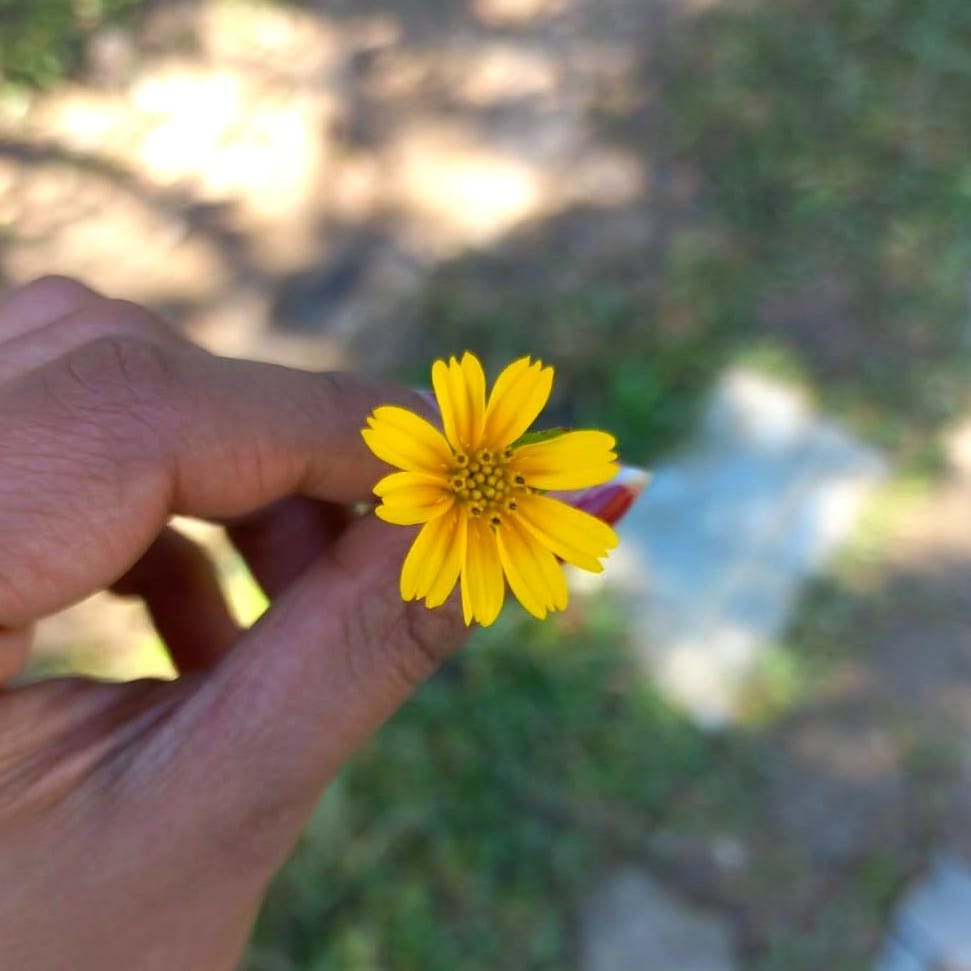Factory flowers - beauty and survival in India’s garment factories
Guest article: Defending the right to flowers

"The jasmine flower scent helps with the headaches from the factory chemicals and heat. It's better than medicine - and we can't afford medicine anyway." - Lakshmi
In thousands of garment factories in Tamil Nadu, women garment workers endure 8–10-hour shifts, racing to complete grueling targets as high as 1,000 pieces of clothing in a single day. The work takes a severe physical toll: Back pain, repetitive strain injuries, and skin conditions from chemical exposure. Adding to their hardships are abusive supervisors and a lack of basic amenities, like food refrigerators, which often leaves lunches spoiled before mealtime.
In the midst of these daily struggles, one enduring tradition catches the eye: Flowers adorn the hair of most women toiling on the factory floor. Jasmine strands delicately preserved from temple offerings, roses salvaged from fading bouquets, or blooms lovingly grown in small home gardens. These are not mere adornments, they are symbols of resilience, comfort, and dignity, offering moments of beauty and relief from the harshness of factory work.
For some women, preserving flowers to last multiple days is a skill passed down from mothers and colleagues. "I learned from older workers how to keep jasmine fresh longer," said Vimala, a 27-year-old machine operator in Tirupur. "We wrap flowers in damp newspaper and store them in a plastic box. This way, one string of flowers can last two to three days."
Misunderstood
The wearing of flowers by garment workers is profoundly misunderstood. It has come under criticism as a sign of ‘financial-illiteracy’ - of frivolous high spending amongst low-waged women who can’t manage their monthly expenses. Flowers have become a target and a way to blame garment workers for their poverty while sidelining the systemic inequities that characterise the garment industry.
But the stories of women workers in Tamil Nadu challenge these misconceptions. They reveal both adeptness in managing extremely limited wages and the way that these flowers, often obtained at minimal or no cost, carry profound meaning. These are flowers worn as acts of self-care, offering a source of joy and resilience amidst the systemic injustices they face.
Lakshmi’s jasmine
Three of the women we spoke to shared how their children pick flowers on nearby farms, either as an additional source of income or to repay debts to farm owners, receiving flowers as payment for their work:
"My daughter picks flowers before school to help support our family," said Lakshmi, a single mother from Erode, her voice breaking. "She can't finish her homework because of this, and sometimes, she gets punished at school. The farm owner gives her a few strands of jasmine in addition to her payment - that's what I wear in my hair.”
Other women make use of the discarded bouquets of flowers that are given to factory visitors. Malathi and Revathi, both 23-year-old garment workers from Dindigul, told us how they preserve roses from these bouquets by dipping them in water for several days.

Ramani’s home-grown flowers
Most women rely on temple offerings or grow their own flowering plants at home. "I grow jasmine in a pot to see something beautiful amidst the slum where I live and to mask the stench of waste," said Ramani, a 32-year-old worker from Dindigul, who tends to a garden of flowering plants in old paint cans. "I only use flowers that have fallen; I never pick from the plants - I know that bees and other insects depend on them."
For Ramani and others like her, growing flowers provides more than just adornment. "It's something of beauty I created, something I own and enjoy - unlike the clothes I make at the factory," she explains.
Swathi, a worker from Bengaluru, shares that her husband works at KR market, a wholesale flower hub in the city. When unsold flowers are on the verge of rotting, he brings home a handful, such as chrysanthemums, for 5 Indian Rupees (approx $0.01 USD). Knowing how much women value flowers and the difficulty in accessing them, Swathi distributes them among her neighbours, many of whom also work in garment factories.
For some, flowers offer comfort and a sense of personal styling in a world where cosmetics are out of reach. “I can’t afford lipstick or makeup. Wearing flowers is my way of feeling beautiful," shares Saraswathi, a 21-year-old garment worker from Erode. "When the jasmine scent catches me during a stressful day, it wakes me up and makes me happy,”
For garment workers, flowers are far more than mere adornments; they are symbols of solidarity, and even tools for resistance.

The Silent Signal of the Flower
Flowers also serve as a subtle yet vital tool for communication and solidarity. The Tamil Nadu Textile and Common Labour Union (TTCU), a women-led textile workers union, has incorporated flowers into their organizing strategy, particularly in the context of the Dindigul Agreement, a multi-party effort to address gender-based violence in garment factories.
“When a woman who regularly wears flowers to the factory suddenly stops, we know to check on her,” explained Muthumari, a union organizer. “It’s often a silent signal that she’s facing violence at home.” This informal early warning system has become essential in communities where openly discussing domestic violence remains taboo.
A Widow’s Right To Flowers
For widows in rural Tamil Nadu, flowers hold an entirely different meaning. Traditionally forbidden from wearing flowers in their hair, widows are socially marked as 'dead,' denied basic forms of self-expression and participation in community life. In Tamil culture, flowers are deeply linked to femininity, auspiciousness, and social inclusion, making this prohibition especially poignant.
The TTCU has consciously challenged this practice, turning their union spaces into sites of resistance. “When a widow comes to our office, we always offer her flowers,” said Poongodi, a senior union leader. “It’s our way of saying she has the right to beauty and choice too. You should see how their faces light up – for many, it’s the first time since their husband’s death that they’ve been explicitly invited to adorn themselves.” The simple act of placing flowers in a widow’s hair becomes a powerful declaration of her continued right to joy, beauty, and social inclusion.

The Real Issue: Poverty Wages
According to a 2022 Asia Floor Wage Alliance (AFWA) report, wages for most garment workers have stagnated for decades in India. In Tamil Nadu and Karnataka, minimum wages range between ₹9,800 and ₹10,500 (approx $118 USD) per month, barely a third of AFWA’s 2024 living wage estimate of ₹34,170 ($402 USD).
In Tamil Nadu, the minimum wage has not been revised since 2014 for the tailoring industry, despite the Minimum Wages Act requiring a revision every five years. Employer opposition and litigation have delayed change, culminating in a Supreme Court case.
The state government’s recent notification halved a cost of living calculation known as the dearness allowance. Compared to earlier drafts, the monthly dearness allowance was reduced from ₹8,130 (approximately $96 USD) to ₹4,070 (approximately $48 USD). In Karnataka, garment workers earn about ₹441 (approximately $5 USD) for an eight-hour shift, far below the daily minimum wage notified for “skilled labor”. In contrast, the average CEO of a global fashion brand earns in just 28 minutes what a South Asian garment worker makes in an entire year.
Flowers are not the reason garment workers are poor. If global fashion brands paid fairly, workers wouldn't need to send their children to pick flowers before school. No amount of financial literacy lessons can address the fundamental issue of poverty wages and systemic exploitation.
Far from being frivolous or unnecessary, flowers are tools of self-care, resistance, and communication, deeply rooted in their communities. They symbolize dignity and survival in a system that denies women their basic rights. As the protest song Bread and Roses goes - it is bread we fight for, but we fight for roses too.
- Nandita Shivakumar is a researcher specialising in gender justice and sustainability in global fashion supply chains. She works with multiple garment workers’ unions to develop their campaigns and communication strategies.
- Nikita Joseph is a communications consultant specialising in online media, non-profits, and policy research. She has worked extensively at the intersection of gender and social justice, and leveraged communications as a tool to advocate for change.
- Edited by Tansy E. Hoskins
Views expressed are those of the authors and do not reflect the opinions or positions of the organizations they are affiliated with.
This article is available for syndication by progressive labour or media partners - please contact Tansy for details via my website.